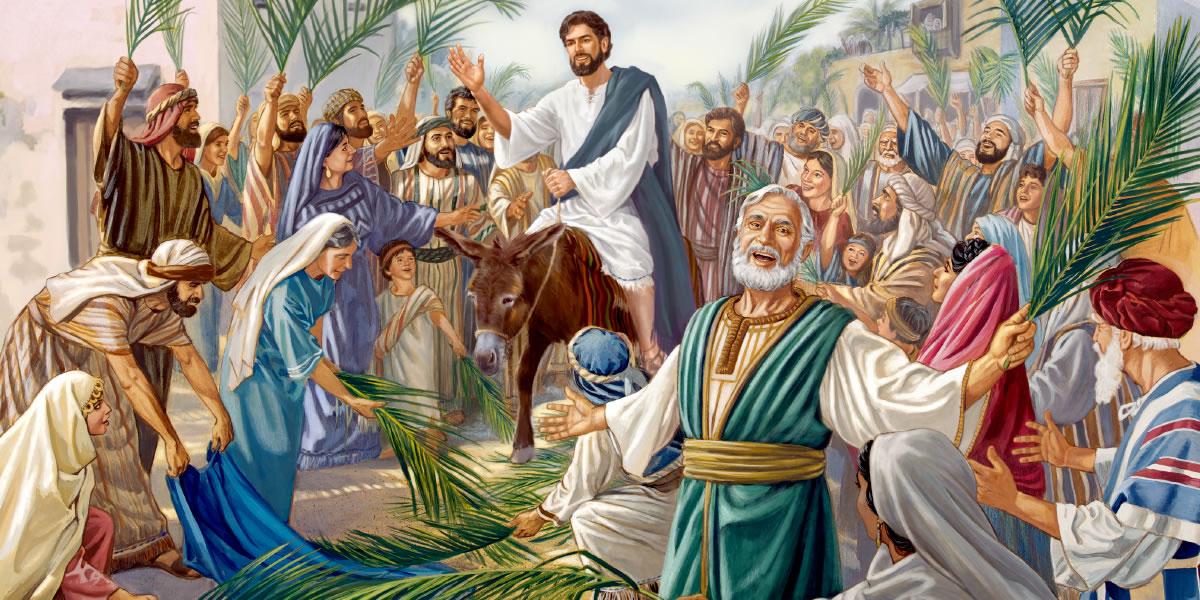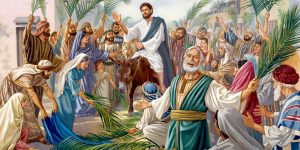
Mark 11.10 AV
Blessed¹ [be] the kingdom² of our father³ David,
that cometh in the name of⁴ the Lord⁵:
Hosanna in the highest⁶.
¹) To praise, celebrate with praises; to cause to prosper, to make happy, to bestow blessings on.
²) A kingdom, the territory subject to the rule of a king. The following words “of our father David” shows that the people had an earthly kingdom in mind.
³) Generator or male ancestor.
⁴) Because of, for the reason of, on account of.
⁵) Kurios, this is a title is given to God, and to the Messiah.
⁶) See what I wrote about this on January 30 (“Entering Jeruzalem (1 of 2)” – Mark 11:1-11). Some more below.
Other translations
Praised and blessed in the name of the Lord is the coming kingdom of our father David! Hosanna (O save us) in the highest [heaven]! [AMP] Blessed is the coming kingdom of our father David! Hosanna in the highest!" [ESV] Blessed the coming kingdom of our father David! Hosanna in highest heaven! [MSB] Blessed be the kingdom of our father David, that cometh in the name of the Lord: Hosanna in the highest. [KJV] Blessed is the coming kingdom of our father David! Hosanna in the highest! [NIV] Bless the coming kingdom of our ancestor David! Praise God in highest heaven [NLT] Blessed is the kingdom of our father David That comes in the name of the Lord! Hosanna in the highest!" [NKJV]
Study
Blessed be the kingdom of our father David
Let the kingdom be prosperous and successful and be established, and endure for ever; to the glory and happiness of him as king, and of all the subjects of it.
Unless the words should be rendered, as by their situation they may be, thus, “blessed be the kingdom that cometh in the name of the Lord, of our father David”; and the sense be, let the kingdom of the Messiah, which is now come, and is set up in his name, who, as God, is David’s Lord, greatly flourish, and long continue; may its king be blessed, and all its subjects happy.
The kingdom of our father David
Their meaning is, let the kingdom promised to our father David, and to his seed for ever, come now.
Our father David
It was more usual with the Jews to call Abraham their father; but, because the Messiah was David’s son, therefore, with respect to him, they here call him their father.
That cometh in the name of the Lord
That kingdom which is coming, and appears in the auspicious reign and government of the Messiah, who is clothed with majesty and authority.
The Latin Vulgate, Syriac, Arabic, and Persic versions, leave out the clause, “in the name of the Lord”. It is also left out in Beza’s ancient copy, and in another; but the Ethiopic version retains it, reading it “in the name of God”. It is added, Hosanna in the highest.
Hosanna
The word is an Hebrew word, which signifies, “save (us) I beseech”; and which words stand in ( Psalms 118:25 ) to which the multitude had reference, as appears from what follows; and are formed into one word, “Hosana”, or “Hosanna”, in which form it frequently appears in the Jewish writings; and because of the often use of it at the feast of tabernacles, that feast was called “Hosanna”, and the seventh day of it was called “the great Hosanna”.
Moreover, the “Lulabs”, or the bundles made of branches of palm trees, and boughs of willow and myrtle, which they carried in their hands at the feast of tabernacles, often go by this name:
It is said “The Egyptian myrtle is right or fit “for the Hosanna”.” That is, to be put into the “Lulab”, or bundle of boughs and branches, which was carried about, and shaken at the above feast.
Again “it is a tradition of R. Meir, that it was the practice of the honourable men of Jerusalem, to bind their “Lulabs” with golden threads says Rabbah, these are they “that bind the Hosanna”; the gloss on it is, “that bind the Lulabs”, of the house of the head of the captivity; for in binding the Hosanna of the house of the head of the captivity, they leave in it an hand’s breadth and says the same Rabbah, a man may not hold an Hosanna in a linen cloth.”
Once more “says R. Zera, a man may not prepare “an Hosanna” for a child, on a good day.”
Sometimes the Hosanna seems to be distinguished from the “Lulab”, and then by the “Lulab” is meant, only the branches of palm tree; and by the Hosanna, the boughs of willow and myrtle; as when “Rabbah says, a man may not fix the “Lulab”, “in the Hosanna”.”
And a little after says the same, “a man may not bind the “Lulab” with the “Hosanna”.”
Now these bundles might be so called, because they were lifted up and shaken, when the above words out of ( Psalms 118:25 ) were recited: for thus it is said, “when do they shake, that is, their “Lulabs”, or “Hosannas?” at those words, “O give thanks unto the Lord”, ( Psalms 118:1 ) the beginning and end; and at those words, “Save now I beseech thee”, ( Psalms 118:25 ) .
The house of Hillell, and the house of Shammai say also at those words, “O Lord I beseech thee, send now prosperity”: says R. Akiba, I have observed Rabban Gamaliel and Rabbi Joshua, that all the people shook their Lulabs, but they did not shake, only at those words, “Save now I beseech thee, O Lord.”
Hence some have thought, that these are meant by the Hosanna in this text; and that the sense is, that the multitude cried, saying, These branches of palm trees we carry in our hands, and strow by the way side, are in honour to the Son of David, the true Messiah, Jesus of Nazareth: but then this sense will not agree with the following clause, “Hosanna in the highest”.
It may therefore be further observed, that certain prayers and songs of praise, were called “Hosannas”: hence we read of “the Hosannas of the sabbath”; which consisted of various sentences in praise of the sabbath, and thanksgiving to God for it, and are concluded with this word “Hosanna”; and of various petitions that God would save them, as he had done others; and at the end of each petition, is this word.
As also of, “the Hosannas of the great Hosanna”; which are certain words of prayer and praise, used on the seventh day of the feast of tabernacles: and whereas at that feast the “Hallell”, or hymn, was sung, which concluded with the 118th Psalm where the words, “Save now I beseech thee, O Lord”, stand, from whence this word is formed.
The true sense and meaning of it here appears to be this; that the multitude that attended Christ to Jerusalem, as they went along, sung songs of praise to him, as the true Messiah; particularly, applying the above passage to him, and earnestly wished him all success and prosperity; and importunately prayed for salvation by him.
Son of David
By calling Jesus the Son of David, they proclaimed him to be the Messiah. Son of David was the usual title by which the Messiah was known among the Jews. And by crying and saying “Hosanna” and “Son of David”, which was done with loud acclamations, and the united shouts of both companies, before and behind; they ascribe all praise, honour, glory, and blessing to him, and wish him all prosperity, happiness, and safety.
× 0 ×
The Messianic expectation of the bystanders resonates very strongly in the words “Blessed is the coming Kingdom in the name of the Lord, (the kingdom of our father David)”. With this they express their expectation that the restoration of the royal family announced by the prophets of David (Amos 9:11; Isaiah 9:6) is now at the door.
Will Jesus’ entry into Jerusalem be followed by the accession to the throne?
In the unusual name “our father David” (cf. Luke 1:32, Acts 2:29) probably lies the unspoken idea that Jesus is the son of David (an indication of the Messiah).
Like the Messiah, the Kingdom also comes in the name of the Lord.
The Messiah and His Kingdom belong together: both appear on the scene at the initiative of the Lord God.
Twitter: @SchoemakerHarry
Website 1: https://devotionals.harryschoemaker.nl
Website 2: http://bijbelplaatjes.nl



